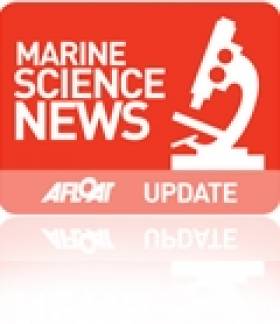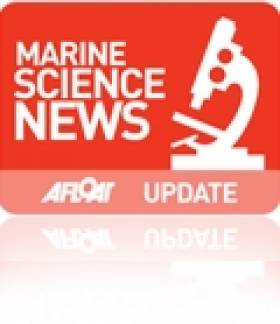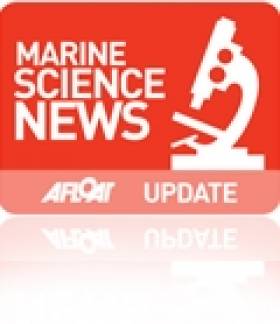Displaying items by tag: Irish research vessels
Taoiseach Announces Marine Jobs On Visit of RV Celtic Explorer
An Taoiseach Enda Kenny visited the Marine Institute's research vessel RV Celtic Explorer in Dublin Port today, where he announced the creation of 92 jobs in the marine sector, writes Jehan Ashmore.
"Ireland is now recognised as an emerging power in Marine Research and Innovation," said the Taoiseach. Of the new positions, 64 will be generated in the seafood processing sector. This follows a €3.5m Seafood Processing Business Investment Scheme administered by Bord Iascaigh Mhara (BIM). In the area of marine research, 28 jobs have been created through funding of €2m from an International SmartOcean Graduate Programme.
SmartOcean is a collaboration between IRCSET (Irish Research Council for Science Engineering and Technology), the Marine Institute, five Irish universities and key multinationals and SME Information and Communication Technology (ICT) companies to provide funding for 28 research posts.
The Taoiseach said: "This has been achieved through the mapping of the 90% of Irish national territory that lies under the Atlantic, the creation of a quarter of a billion Euros worth of marine research infrastructure, and the fostering of strong linkages between industry and research centres, all of which will support employment opportunities in key areas of potential growth in the marine sector."
During the tour of the RV Celtic Explorer, the Taoiseach who was accompanied by Minister for Agriculture, Marine and Food, Simon Coveney, welcomed the expansion of Ireland's capabilities in the international shipping services sector, which is expected to attract additional jobs to the country.
Ireland's emerging international shipping services sector has continued to grow, underpinned by a number of investments in new and second hand ships over the last twelve months by such companies as Arklow Shipping and the Mainport Group, as well as foreign direct investments by D'Amico and Ardmore shipping.
As reported on Afloat.ie, RV Celtic Explorer had arrived yesterday into Dublin Port, having completed a fisheries demersal survey which started in Galway on 23 September. Initially she had docked at Ocean Pier but she subsequently shifted berths to Sir John Rogersons Quay for today's reception of An Taoiseach. According to her survey schedule she is due to depart tomorrow on a herring acoustic survey which is to take place in the Celtic Sea and off the south-west coast.
- Dublin Port
- BIM
- Marine Institute
- marine science
- Arklow Shipping Ltd
- Bord Iascaigh Mhara
- Ports and Shipping News
- Ardmore Shipping
- Mainport Group
- D'Amico
- Irish marine jobs
- An Taoiseach Enda Kenny
- SmartOcean
- RV Celtic Explorer
- RV Celtic Voyager
- Sir John Rogersons Quay
- Irish research vessels
- Simon Coveney
According to the vessels survey schedules, RV Celtic Explorer had today completed fisheries demersal surveys which started in Galway on 23 September. The near fortnight-long survey was conducted in the ICES area VI, under the direction of chief scientist, Dave Stokes.
On Friday she embarks on a herring acoustic survey which is to take place in the Celtic Sea and the south-west. This survey will be under chief scientist Ciaran O'Donnell and is to de-mobilise in Cork on 27 October. To read more about her 2011 survey programme click HERE.
Across Dublin Bay in neighbouring Dun Laoghaire, the 31m RV Celtic Voyager is currently nearing the end of a month-long hydrography survey of the Celtic Sea. The survey had started in Howth Harbour on 17 September under chief scientist Kevin Sheehan. For the time-being she remains moored in Dun Laoghaire prior to resuming survey work which will continue until the vessel de-mobilises in Rosslare in mid-October. To find out more about her remaining surveys for this year click HERE.
On the surveys outlined they are conducted on behalf of Marine Institute scientists, though the vessels are also allocated ship-time for use of third parties. These include government departments and agencies, universities, research institutes and industry. For further information on the research vessels, survey schedules etc can be found by visiting: www.marine.ie/home/Research+Vessels.htm
Research Vessel on Hydrographic Survey Calls to Dun Laoghaire
RV Celtic Voyager is an inshore RV and she can accommodate 6 - 8 scientists with a maximum endurance of 14 days. According to her intensive survey schedule she is currently conducting hydography work for this month entirely. To read her complete survey programme click HERE.
In 2002 she was joined by a second though considerably larger vessel the 65m RV Celtic Explorer, which is six times larger than her fleetmate in terms of tonnage, which is 2,425grt. Apart from all the scientific and deck machinery she can also handle seven 20-foot containerised laboratories.She has accommodates for 35 personnel, including 19-21 scientists and has an endurance window of 30 days.
The vessel was also built by the same Dutch shipyard and both are owned by the Marine Institute. Ship management of the Galway based pair is provided by P&O Maritime Services (Ireland) Ltd.
In addition the ROV Holland I a deepwater Remotely Operated Vehicle is operated on board the RV Celtic Explorer. The ROV is named after John Phillip Holland from Liscannor, Co. Clare who was an early inventor and builder of submarines. For more information about the ROV which forms as part of tonight's 'Sea2Sky' event in Salthill, Galway, as previously reported on Afloat.ie click HERE.
Today is European Researchers Night, where the ROV will be on display in Galway
- Marine Institute
- Dublin Bay News
- Ports and Shipping
- Ports and Shipping News
- ROV Holland I
- Dun Laoghaire News
- Marine Science News
- Dun Laoghaire Harbour News
- Marine Instistute Research vessels
- Damen B.V. Shipyard
- P&O Maritime Services Ltd
- Submarine inventor John Philip Holland
- John Holland
- Irish research vessels


























































